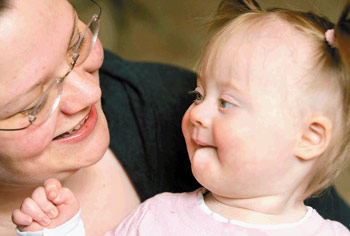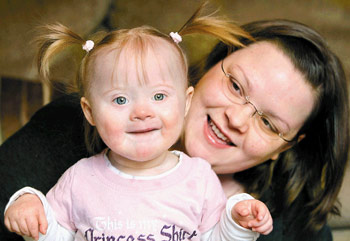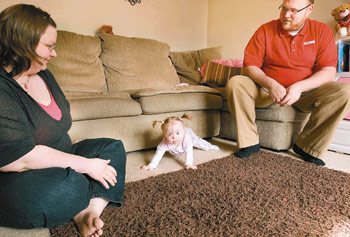Grafton and the City of Winchester Partner to Provide Early Intervention Services
Grafton Schools, Inc. is now the lead service provider for infants and toddlers in need. Money from its program covers families’ co-pays and those who are uninsured.
By Danielle Nadler
March 18, 2010
Winchester- Jennifer Harrell will admit it: When she heard her daughter would most likely be born with Down syndrome, it broke her heart.
“You have this idea of the perfect baby, and you kind of mourn that idea,” the local mother of two said. “At this point, I can say I am completely blessed to have a child with Down syndrome. She is the happiest baby.”

Jennifer and Bruce Harrell share some moments with their daughter Karringhton. “She is the happiest baby,” Jennifer says. The Harrells are a testament that it is not easy for parents with special-needs children to find where to turn for help.
(Photos by Scott Mason)
Harrell, in large part, credits physical therapy and other intervention services for her happy 16-month-old daughter Karringhton.
Since the baby was two months old, she has worked with a therapist to build her muscle tone and help her eating — a cost covered by a federal program called Part C.
The Part C dollars to help Winchester-area children from birth to age 3 will now go through a local intervention provider, Grafton Schools Inc., instead of a government agency.
Since the private nonprofit organization took over as the lead service provider for the young age group in January, it is seeking to spread the word about this little-known help for local infants and toddlers.
In order to do so, the City Council approved a first-time partnership between the city’s Department of Social Services and Grafton. The federal and state funds — $138,911 a year — will pass through the city to Grafton with no cost to local government.
The money covers families’ co-pays and those who are uninsured, so no family is turned away.
*
Grafton, which has corporate offices at 120 Bellview Ave., serves children and adults with emotional disturbances, learning disabilities, mental retardation, autism, and severe behavioral disorders.
With Grafton in control of those services for children 3 and younger, more children will be served than in years past. At least, that is the hope of Grafton education administrator Allyson Bateman.

Grafton serves 127 children in the Shenandoah Valley region under the new initiative. However, Bateman believes at least 100 eligible children are missing assistance they could receive.
“We’re working on public awareness,” she said. “What we’re finding is that a lot of people thought these services went away.”
James Madison University provided early intervention services for several years. When the university stopped the services in the area, many local families and even pediatricians did not realize those services were picked up by the Virginia Department of Behavioral Health and Developmental Services (DBHDS).
The state agency, based in Richmond, contracted with local therapists and educators.
Bateman said the agency did a good job, but could only do so much from its office, 140 miles away.
So Grafton offered to take up where the DBHDS left off.
“Grafton is looking to determine what additional progress can be made in identifying children in need of early intervention,” said Jim Gaynor, chief executive officer of the organization.
During the past two months, Grafton has launched a campaign to ensure that no disabled child is overlooked.
The organization is connecting with pediatricians and neonatologists, producing advertisements, and working to develop presentations that will share early developmental “red flags” for parents.
“We want to disseminate a message to families that relays: We are here to help,” said Shweta Adyanthaya, Grafton’s director of communications.
*
In order for services to continue without a hitch, Grafton brought on the same group of contractors as DBHDS — three service coordinators, one early-childhood educator, and one program manager.
The contractors work with children at home, at their day-care facilities, or wherever needed.
For example, if trips to a department store trigger tantrums in an autistic 3-year-old, the therapist will work with the child at a store.
“We teach everyone who works with the child — the day-care provider, siblings, and parents — how to help them, so that it’s a constant therapy,” Bateman said.
The goal is to work with a child until he or she no longer needs therapy.
“We want to impact them for life,” Bateman said.
The short-term goal, she added, is to help families with disabled children reconnect with regular life.
They often isolate themselves, Bateman said, “because of how much work it takes. Anything we can do to assist families and give them more freedom, then that’s a good thing.”
*
Harrell, 45, is a testament that it is not easy for parents with special-needs children to find where to turn for help.
She and her husband Bruce knew an organization must exist that would assist their daughter to get the most out of life, but they were not sure how to find it until their pediatrician recommended the local service provider.

“It’s very hard to come into the special-needs community when you don’t know where to start,” said Harrell, who shares information about the services her daughter has received whenever she has a chance. “I was so fortunate to find this help. She probably wouldn’t have gotten that therapy that she needed otherwise.”
This week, for instance, Harrell met a parent of premature twin babies who had never heard of Grafton.
The organization, established in 1958, operates residential schools near Berryville and in Winchester and Richmond.
Families who are not aware of the free assistance will go to hospitals and clinics for therapy and pay out-of-pocket or, worse, never receive the needed help.
That’s what concerns Bateman.
“From birth to 3 is the time in development when you are learning thousands of skills,” she said. “It truly is the time when we can make the largest impact.”
Grafton will screen referred infants and toddlers to determine whether they are eligible for help under Part C.
Children with a 25 percent or greater delay in developmental areas, including brain function, language skills, social and emotional skills, and with a diagnosed physical or mental condition qualify for the help.
*
For information about Grafton Schools Inc. or to refer a child, call 540-542-0200 or visit www.infantva.org.
— Contact Danielle Nadler at
dnadler@winchesterstar.com
1. Thankful for Part C
March 18, 2010 01:06 am
This program is absolutely wonderful for children with special needs. My daughter, Karringhton (mentioned in this article) has been receiving services since 2 months old. She is quite behind physically but I believe with these services she will improve greatly. She actually just had therapy today and we had a breakthrough and her therapist, Amy, has found a solution to my daughters balance problems and with her help, I believe that she will improve greatly in no time. Also I wanted so say that the therapist in this program and the cordinator are wonderful. Everytime we had a question we never heard “I don’t know”. I have always heard, “We will find that out for you”. Having a child with special needs is very stressful and sometimes scary but the people in this program have made things so much easier for my family and I thank them greatly for that.
-Jennifer Harrell